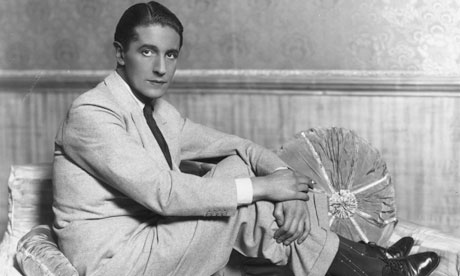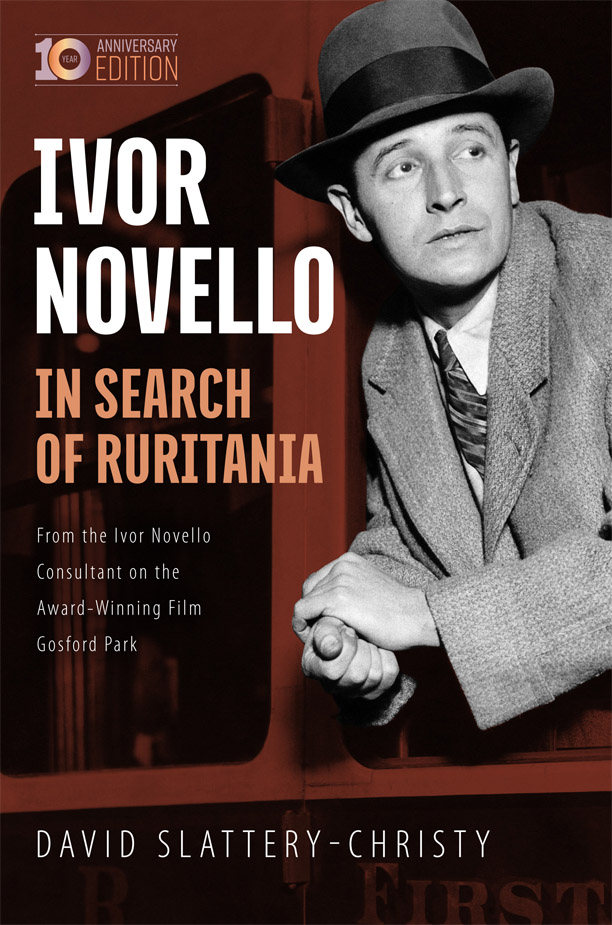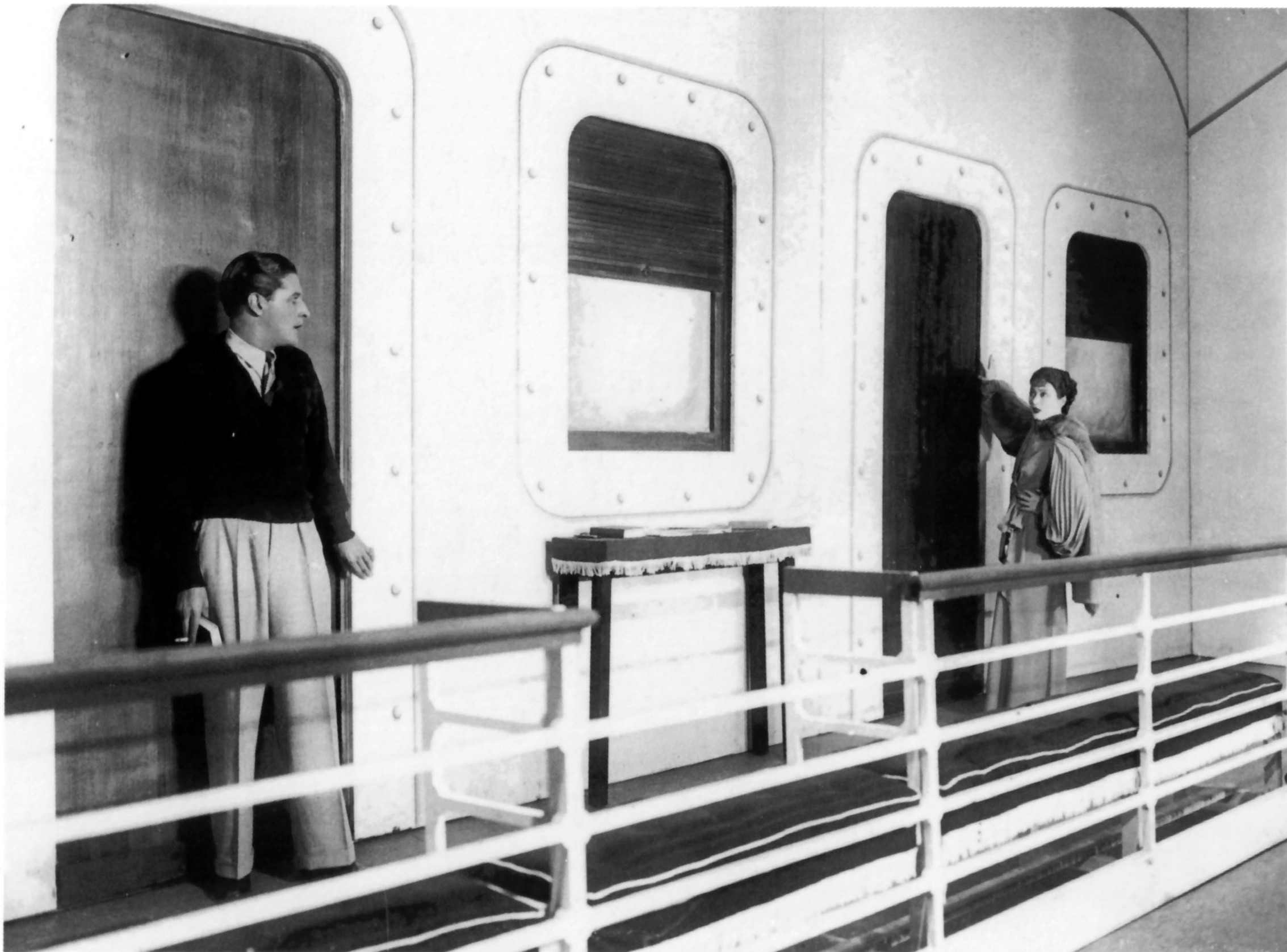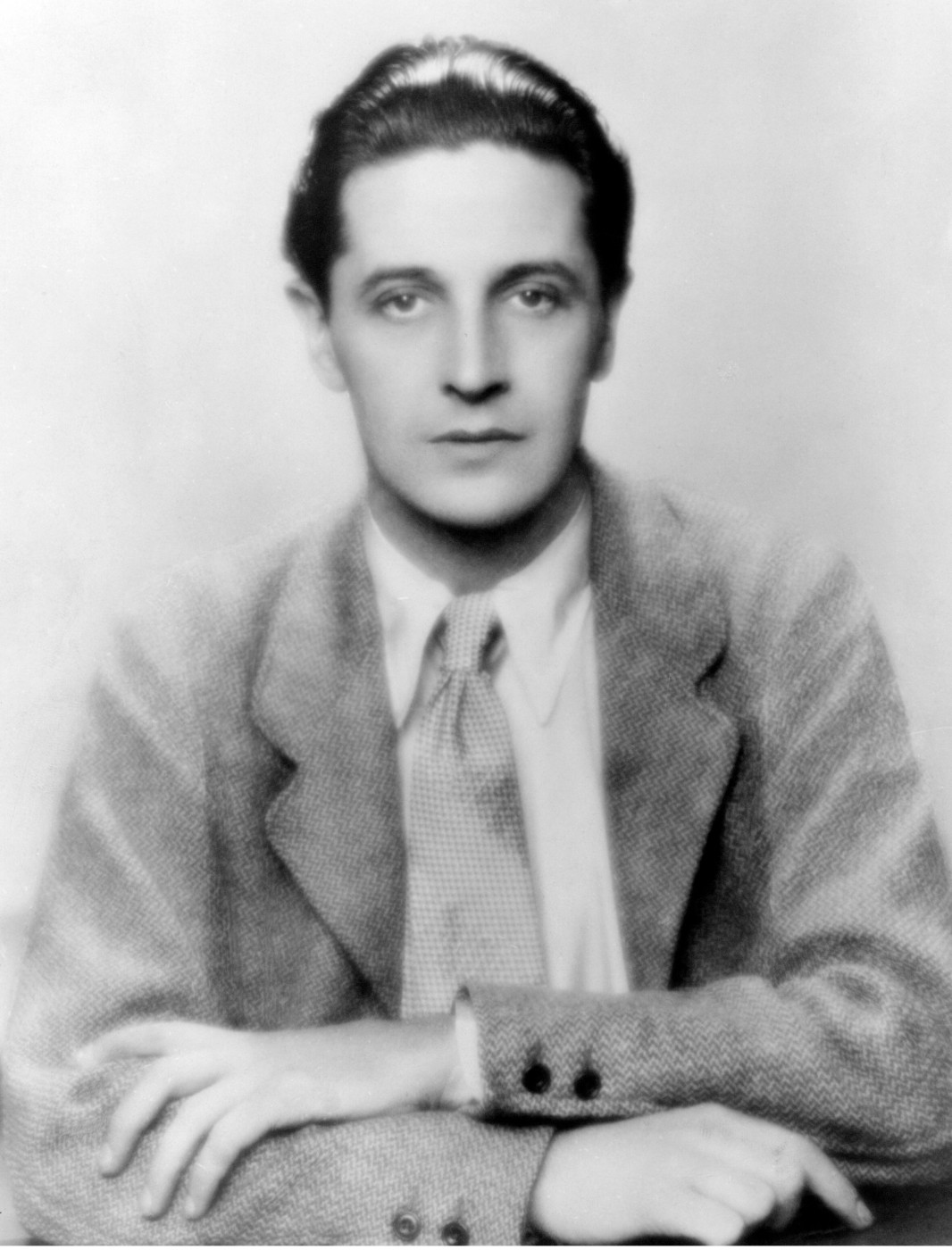Kevin Clarke
Operetta Research Center
24 December, 2016
Operetta star performer and writer Ivor Novello (1893-1951) will be featured as “Composer of the Week” for BBC Radio 3 for the first time in its 70 year history. Novello’s biographer David Slattery-Christy was the script advisor and will also be guest of the week for the Christmas 2016 broadcast on December 26th to 30th. The Operetta Research Center spoke with Mr. Slattery-Christy about his fascination for Novello and why his oeuvre hasn’t been rediscovered by a younger generation, like the works of Novello’s great competitor Noel Coward have.

Ivor Novello: the image the BBC chose to advertise their program.
Novello was a top West End star composer, the Andrew Lloyd Webber of his time, yet today he’s mostly forgotten, even among diehard musical theater aficionados. Is the lush romanticism of his West End operettas not in sync with our modern times? Is he an exclusively British phenomenon that doesn’t translate to other countries, such as the USA, or Germany and Austria?
Novello’s musicals, written in an operetta style, have not stood the test of time well. Many consider his creations to be too sweet, too lushly romantic to be taken seriously. Modern musical theatre audiences have had scant opportunity to actually evaluate Novello’s shows as it has been decades since a fully professional production was undertaken. My adaptation of Novello’s Glamorous Night had a few performances in Buxton in 2008 and the show worked really well after some serious surgery and demonstrated its potential. Those in other countries, especially where operetta is still popular, should consider Novello’s shows in more detail. They would be surprised.

David Slattery-Christy (l.) at the BB3 studio for the Ivor Novello program, with Donald Macleod. (Photo: David Slattery-Christy)
How does Novello’s “romantic” operetta music compare to Franz Lehar’s operettas or Sigmund Romberg’s Broadway offerings? Both have managed to secure their place in musical theater history. What do they have that Novello doesn’t have?
This is an interesting point. For me, and I would argue this strongly, the reason Novello’s shows have languished in obscurity after his death is for two reasons. There was no near relation left when he passed away that could manage and champion his legacy – he was homosexual so had no children. Had that not been the case, and there were direct descendents, I think he would have been remembered differently today. His friends and colleagues, out of love and good intentions, almost suffocated his legacy by being over protective about his life. In a way, I feel they inadvertently did his memory more harm than good by being too protective of him. The other point I would add here is that Novello as a young boy was captivated and entranced by watching the Edwardian actress Lily Elsie from the gods of Daly’s Theatre during the run of Lehar’s The Merry Widow (Elsie played Sonia, the widow) – he never forgot what he saw and the production values.

Lily Elsie and Joseph Coyne in “The Merry Widow,” 1907.
Moreover, his operetta style is, I feel, strongly influenced by Lehar. We must also remember that operetta was the favored musical theatre style – most of which were developed and created in Germany and Austria before arriving in the UK – this would end with the outbreak of WW1. As a result German and Austrian operetta fell out of fashion. In some ways Novello was able to fill a void left and was considered old-fashioned even in his own time. The only thing that sets Novello apart from other operetta composers is exposure of his work.
How did you yourself discover Novello, what hooked you?
I had an aunt in Oxford who loved Novello and his music. I was exposed to it at an early age and became enchanted and drawn into his world. Musically, his compositions have a melancholy at times that is irresistible. I still find it thrilling to hear his music and especially the music from the early revue shows from 1916 to 1922 that have been specially recorded by the BBC Concert Orchestra for Composer of the Week. They show there was much, much more to Novello’s abilities than the obvious romantic melodies of his later musicals. Exciting to hear this music for the first time in 100 years!

10th anniversary edition of “In Search of Ruritania.”
You wrote a noteworthy biography of Novello that offers a new approach after the various “historic” publications that came before. Did these vintage books damage the image of Novello, and what was your new perspective?
My biography on Novello – In Search of Ruritania – is most certainly not a sentimental journey. The biographies that came before, I felt, sanitized Novello and did not give a true idea of his character and life. They all glossed over any mention of his homosexuality which I felt absurd and did him no favors. After so much research in to the man, I felt he would have been the last person to conceal his sexuality had it not been necessary. Besides, everyone knew. All the fans knew that, or had a pretty good idea, but preferred to avert their gaze less it ruin their romantic dream of him.
Don’t forget, Novello rose to fame after WW1 as film star and actor/playwright based on his matinee idol looks – and there were plenty of unmarried and widowed women as a result of WW1 who directed their fantasies at Novello because there was a shortage of actual men to go round. It was the era of the maiden aunt and the widow! Most of the early books also failed to really look at the prison sentence he served for petrol fraud in WW2. Deeper analysis, and the motivations of Dora Constable, give a better perspective of the whole sorry affair – one where Novello does not emerge wholly smelling of his famous Lilacs it has to be said. I wanted to see Novello for all his faults, failings, homosexuality as well as the remarkable creative artist he was. They were all elements that made him who he was.
I have received hate mail because of it, but I would not change a thing.
My biography celebrates its 10th anniversary this Christmas with a new edition. It has sold consistently in that entire period, so that speaks for itself.

Novello and Mary Ellis in “Glamorous Nights”.
Your title is In Search of Ruritania. What does that mean?
This is easy to answer. Ruritania was the mythical land in which he set his romantic musicals from Glamorous Night to the Dancing Years, Perchance to Dream and King’s Rhapsody. I used it in the title of the book as it summed up my journey to go in search of Novello’s Ruritania and understand it. For Novello, Ruritania was a kingdom like that which existed in Lehar’s The Merry Widow – but one all of his own invention.
You openly discuss the fact that Novello was a gay man living with a partner for most of his life. Yet his homosexuality – though dealt with in a vested way in many of his operetta plots – had to remain secret because of the legal situation in Great Britain. How important is the gay side of the story for an appreciation (and possible rediscovery) of Ivor Novello?
For me, to understand Novello and his work as a composer you have to factor in his homosexuality. I mentioned in a previous comment about an underlying melancholy in his music – this is because perhaps he had to repress his true feelings and emotions, and especially on stage where he had to pretend to fall in love with a leading lady, whereas his inclination was to love a man. I could also argue that many women worshipped Novello because deep down they knew he was homosexual and thereby was no threat to them in a physical way. He became the object of their respective fantasies and there was no other woman (i.e. Novello wasn’t married) to distort their romantic fantasies of him. Novello was no fool, and happily capitalized on this obsession. The one time fantasy and reality collided was when he met Dora Constable in WW2 through a cast member. She was the catalyst that caused him to go to prison. I am sure there were homosexual men who also used him as a fantasy romantic figure in their repressed lives during that time. Novello should be more visible as a gay icon but that said he has become much more prominent in the last ten years – especially since Gosford Park brought him to a whole new audience around the world.
In your book you describe how the heirs and female friends of Novello burned all “compromising” material after his death. So unlike Noel Coward, in whose case all the letters, diaries etc. have been published by the estate, Novello’s private life was pushed back into the closet. How does this affect his legacy as a composer and theatrical person of importance?
This is indeed one of the greater tragedies for Novello. Had he had a direct family member then perhaps the situation would not have arisen. Bobbie (Robert Andrews) his life-long partner immediate burned lots of papers within a few hours of Novello’s death. I can only surmise there were sensitive papers and documents that could have caused embarrassment and tarnished his legacy – at least in Bobbie’s eyes. We have to remember that homosexuality was illegal at that time and it could have impacted on Bobbie and other friends who were still very much alive. With Coward, who had a much younger partner, his legacy was preserved because that helped greatly. Also, Coward was a playwright of greater skill than Novello. Novello wrote parts for him and his friends to perform in – anyone else playing the parts just didn’t work. That said, Coward went through a period of being seen as a bit old fashioned and a has-been during the emergence of the kitchen sink dramas of the late 1950 and 1960. Had all Novello’s papers and documents survived, they would be read and analyzed in a very different way today. Sadly that was no to be.

A dashing looking young Ivor Novello in a typical publicity shot.
Why has a young LGBTIQ generation in the UK not discovered Novello as a famous “Gay Icon” à la Oscar Wilde or Alan Turing or Roger Casement?
Novello’s profile is going through something of a resurgence. I am sure that the LGBTIQ community will take him to their hearts when they discover him. A film of his life would, I am sure, initiate this as it has with Alan Turning. My hope is that a film will be made.
As “lush” and “overtly spectacular” as many of his shows are, some of them deal with serious political topics. For example in The Dancing Years he shows a Jewish composer from Austria, arrested by the Nazis and sentenced to death. This show was a big West End hit in the 1930s, when such things happened “for real” in Germany and Austria. Yet, after the war and in recent years the Nazi aspect has remained completely eliminated. Why?
This is something that is largely forgotten when those ignorant of the facts dismiss Novello musicals as light and frothy and pointless. They are none of those things. As you say The Dancing Years (1939) dealt with a Jewish Composer and the Nazis – all references to Nazi persecution cut by the Lord Chamberlain before he would give a performance license for the show. Glamorous Night (1935) was based on the affair between Madame Lupesco and the King of Romania [hot gossip in London at the time] but also has shadows of the Wallis Simpson and Edward VIII crisis and abdication woven into the story. King’s Rhapsody (1949) also has elements of a royal scandal that broke between Charles and Diana many years after the show had been forgotten.

Ivor Novello as Rudi Kleber, being arrested by the Nazis. Scene from the original London production.
I did do an adaptation of the Dancing Years that reinstated the Nazi element but because of rights issues it was never released for consideration. I did, as previously mentioned, undertake a new adaptation of Glamorous Night, using Novello’s original papers and script, to create a show that is certainly worthy of a professional revival. More companies in Germany, Austria and the USA need to be made aware of these works. That should be on my mission list for 2017.
I always wonder why Andre Rieu doesn’t include any Novello music in his shows.
I have written to him about it but never got a reply. That baffles me too.
Novello was a feature character in the film Gosford Park. How important was this inclusion in the film for the renaissance of Novello?
Novello’s emergence from the mists of time in Gosford Park awoke an interest in Novello around the world. Many were intrigued by this character in the film that was based on a real person who really did compose music. The music in the film also created interest because it was so captivating. It was the beginning for Novello. After Gosford Park, Sir Cameron Mackintosh decided to rename the theatre that Novello lived in a flat above in his lifetime, to the Novello Theatre in the West End of London. The music awards that bears his name went from the Novellos to the Ivor Novello Awards. I have been lucky to be asked to participate in some pretty high-profile tributes on BBC Radio and Television in recent years. The latest being BBC Radio 3 and their “Composer of the Week” dedicated to Novello this Christmas.
There are various historic and modern recordings of Novello’s music. Do you think that the recent albums by people such as Marion Grimaldi or Marilyn Hill Smith do his music justice? What’s your own favorite Novello album/singer?
I like the recordings that remain true to the original intention. Some singers struggle to sing in the required style and thus become shrill or shouty in their renditions. Marilyn Hill Smith gives lovely understated performances that have real soul. The new recordings for “Composer of the Week” are outstanding and certainly now among my favorites.
To get back to Noel Coward, the eternal competitor, or Cole Porter: their songs have been recorded and re-recorded by every modern pop artist, from Robbie Williams to Marianne Faithful. Why has Novello’s music not been re-interpreted by new singers for a new generation of listeners?
This is all down to exposure. Most people do not realize that Novello wrote so many witty revue songs – and was doing so long before Noel Coward. Even those that are remembered are attributed to Coward [like “And her Mother Came Too” and “What A Duke Should Be”] but were actually written by Novello. It is a great honor for a composer to be featured on BBC Radio 3’s “Composer of the Week” – this kind of exposure can make a real difference and more people will discover Novello as a result of it.
“Composer of the Week” is five one hour long programs that will be broadcast daily from December 26 to 30 on BBC Radio 3 at 12 noon (GMT). Each program will look at a different aspect of Novello’s life and composing career. The topics are: “Keep The Home Fires Burning,” “The Next Valentino,” “Glamorous Night,” “Singing For World Peace,” and “Novello Does Time.” There are new recordings by the BBC Concert Orchestra of music from early revue shows that have not been heard for 100 years. As Novello’s biographer I am guest of the week with presenter Donald Macleod.
Are there any big Novello highlights coming up?
For me the focus will be getting some real attention and consideration for a biographical film of Novello. I know that Robert Altman had it in his mind, but sadly he passed away before anything could be developed. I also aim to make more operetta companies around the world more aware of Novello’s musicals – especially my adaptation of his first musical hit Glamorous Night.
About David Slattery-Christy:
He was born in Oxford, England, in 1959. He graduated from London’s City University with a BA (Hons) Degree in Journalism. In addition to this he has a Teaching Degree from Lancaster University and a Masters Degree in the Arts from the University of Central Lancashire. He continues his professional development with courses at the University of Oxford. Prior to this he attended London Theatre Arts to study drama, and then worked extensively in the performing arts industry as a playwright, producer and director. His stage plays include the award winning Forever Nineteen, After the Tone and The Post Card – which enjoyed London and New York productions, as well as touring nationally in the United Kingdom.
His involvement in adapting the libretto for Ivor Novello’s 1935 musical Glamorous Night resulted in him directing the 50th Anniversary Concert to celebrate the life and work of Ivor Novello at the Theatre Royal, Drury Lane, in London’s West End. Subsequently he has worked as the Ivor Novello Consultant on Julian Fellowes and Robert Altman’s Oscar and BAFTA winning film Gosford Park, and contributed to the BBC Documentary on the life of Novello, The Handsomest Man in Britain. He is the author of In Search of Ruritania, a biography on Ivor Novello – featured on BBC Radio 2 as part of the Great War Centenary celebrations 2014. Anything But Merry! The Life and Times of Lily Elsie the Edwardian actress and singer who found fame in Lehar’s The Merry Widow; the novel The Mistletoe Haunting – Legend of Minster Lovell, and Mildred on the Marne: Mildred Aldrich, Front-Line Witness 1914-1918. He has currently completed a new play based on the relationship between opera composer Puccini and his wife titled Elvira & I – Puccini’s Scandalous Passions!

Gay’s The Word was revived at Jermyn Street Theatre, London recently and proved to be great fun – even without a Cicely Courtneidge! BUT the main problem with all the previous shows, with the possible exception of Perchance To Dream, is that the book(i e dialogue) is SO dated, rather than period! Also, most of the oeuvre needs grand, spectacular staging such as was common in the 1930′s (sic White Horse Inn at London Coliseum) and without that they can appear to be very ‘thin’.
Well said John Groves and more fascinating information from DSC. I was lucky to see the new adaptation of Glamorous Night at Buxton.
I love Novello’s music and recently played and sang What a Duke Should Be in a concert as part of a tribute to the Somme. I’d never have known about this song without Gosford Park. I congratulate Ross Leadbeater for his work reviving Novello and feel Novello’s legacy will best live on in high-quality concert performances demonstrating his fabulous music.
The major problem any stage show from that aged faced, and will face again again if someone looks to revive it, is the cold dead clammy hand of the Lord Chamberlain. It’s easy to snigger when you read “Lord Chamberlain wishes to be informed of the manner in which the plank is in future to be carried”, but back in the thirties no-one was allowed to mock the Nazis (although it was apparently fine for the Queen Mother to teach her children to goosestep), the papers gave no hint at the then King’s affair and impending abdication, there was serious talk about banning Chaplin’s “Great Dictator”, and Jean Metcalfe was only allowed to work at the BBC after she’d shown that her father was employed in a suitable profession. Is it any wonder that what got through the establishment net was such witles drivel. And who would watch Willi Fritsch romancing Lilian Harvey so charmingly and think “Let’s give the part to Jack Hulpert”
I saw Novello’s “The Dancing Years” at the Ohio Light Opera last summer – my first exposure to his music after many years of being an “operetta nut.” Nicely set for voices, expertly orchestrated – and utterly unmemorable. “Warmed-over Romberg” was my gut reaction.